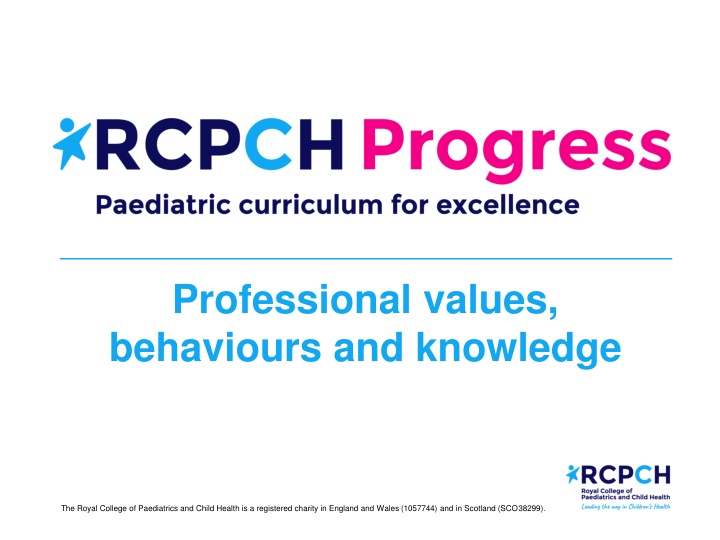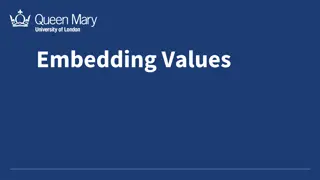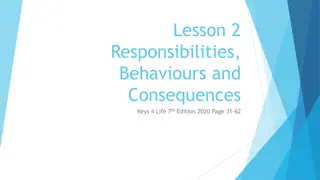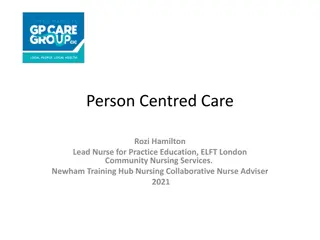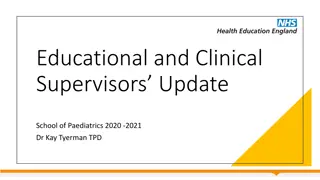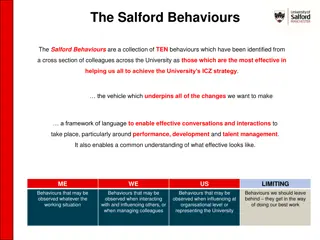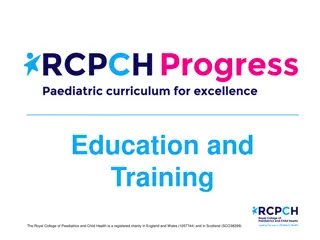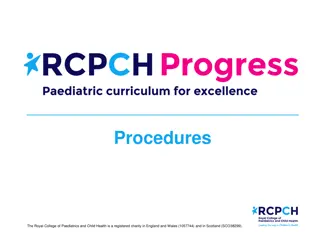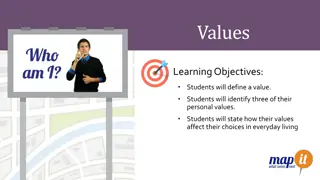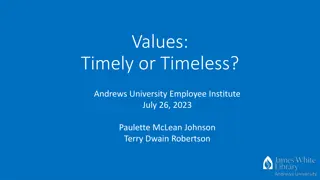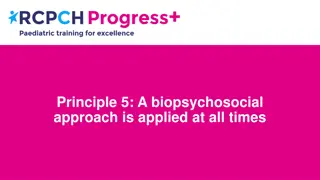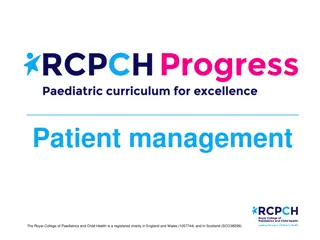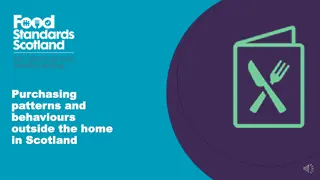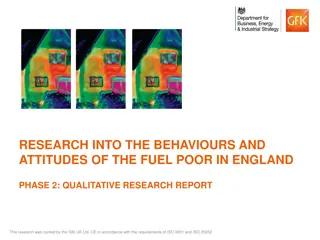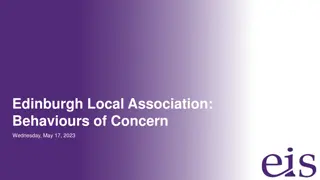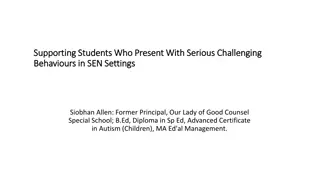Professional Values, Behaviours, and Knowledge in Paediatrics Training
The Royal College of Paediatrics and Child Health outlines the essential professional values, behaviours, and knowledge required for paediatric trainees. This includes maintaining confidentiality, understanding legislation related to safeguarding, and demonstrating ethical conduct across different healthcare systems. Trainees progress through levels, addressing key capabilities and responsibilities at each stage to ensure high-quality care for children and young people.
Download Presentation

Please find below an Image/Link to download the presentation.
The content on the website is provided AS IS for your information and personal use only. It may not be sold, licensed, or shared on other websites without obtaining consent from the author.If you encounter any issues during the download, it is possible that the publisher has removed the file from their server.
You are allowed to download the files provided on this website for personal or commercial use, subject to the condition that they are used lawfully. All files are the property of their respective owners.
The content on the website is provided AS IS for your information and personal use only. It may not be sold, licensed, or shared on other websites without obtaining consent from the author.
E N D
Presentation Transcript
Professional values, behaviours and knowledge The Royal College of Paediatrics and Child Health is a registered charity in England and Wales (1057744) and in Scotland (SCO38299).
Curriculum overview Learning outcomes In addition to the professional values and behaviours required of all doctors (Good Medical Practice), a paediatric trainee must maintain confidentiality, but judges when disclosure may be required in relation to safeguarding, taking into account the differing legislation and health services between the four countries. Level 1 Adheres to the specific legislation (including safeguarding) and healthcare systems between the four counties which applies to children and families; acts as a role model and guide to junior colleagues, developing and ensuring professional values and behaviours in relation to paediatrics and encouraging an open and supportive working environment. Level 2 Adheres to current legislation related to children and families (e.g. adoption and safeguarding). Adopts a self-regulatory approach to their own behaviour and demonstrates the professional qualities required by a paediatrician undertaking independent practice across the four countries. Level 3
Curriculum overview Learning outcome In addition to the professional values and behaviours required of all doctors (Good Medical Practice), a paediatric trainee must maintain confidentiality, but judges when disclosure may be required in relation to safeguarding, taking into account the differing legislation and health services between the four countries. Key capabilities Follows the principles of law with regard to consent; the right to refuse treatment; confidentiality; and the death of a child or young person. Demonstrates the professional behaviours and attitudes required of doctors (and outlined in Good Medical Practice) within the scope of knowledge, skills and performance, safety and quality, communication, partnership and teamwork, and the maintenance of trust. Demonstrates compassion, empathy and respect for CYP and their families. Level 1
Curriculum overview Learning outcome Adheres to the specific legislation (including safeguarding) and healthcare systems between the four counties which applies to children and families; acts as a role model and guide to junior colleagues, developing and ensuring professional values and behaviours in relation to paediatrics and encouraging an open and supportive working environment. Key capabilities Demonstrates self-awareness and insight, recognising their limits of capability and demonstrating commitment to continuing professional development (CPD). Assesses the capacity to make informed decisions about medical care in children and young people (CYP). Manages relationships where religious or cultural beliefs may cause conflict between healthcare professionals. Level 2
Curriculum overview Learning outcome Adheres to current legislation related to children and families (e.g. adoption and safeguarding). Adopts a self- regulatory approach to their own behaviour and demonstrates the professional qualities required by a paediatrician undertaking independent practice across the four countries. Key capabilities Applies knowledge of current legislation related to children and families. Practises independently in a safe manner. Level 3
Underpinning knowledge Accountability and Responsibilities Legislation, Duty of Candor, GMP, GPCs Professional values & behaviours Reflection and Resilience H&S and E&D. Positive Professional attributes e.g. honesty, integrity, empathy
Useful training and resources Local training on Duty of Candour Child Bereavement Days Level 3 Safeguarding Training RCPCH Safeguarding courses and e- learning (https://www.rcpch.ac.uk/resources/safeguarding- available-learning-resources) RCPCH courses: Effective Educational Supervision / EES plus RCPCH course: Mentoring skills
Professionalism case studies A trainee organised the local paediatric training programme around case presentations. Of the four cases presented monthly, one is always presented by the patient or parent themselves. A 14 year old patient presents with cardiac arrest after a suspected overdose. CPR is attempted but is unsuccessful. The trainee carries out examination of the body, supervised by the consultant, with the police. Follow-up with a 13 month baby born at 31 weeks indicates a genetic disorder which may have been hereditary. The trainee discusses the possible impact on developmental milestones with the parents, and the pros and cons of further testing for the family, who are hoping to have another child. SUDI in a 2 month old, Muslim family. The family are keen to bury the baby within 24 hours as per their religious beliefs. The trainee discusses with the coroner, then gets the Iman to speak with the family to explain why this is not going to be possible. 9 month old with unexplained skull fracture. Parents are local GPs. Full safeguarding workup is needed the trainee is non-judgmental, liaises with relevant agencies and discusses with the consultant early, but does so with tact and diplomacy given who the parents are. Additional case studies can be found on the website
Good Medical Practice (GMP) https://www.gmc-uk.org/ethical- guidance/ethical-guidance-for- doctors/good-medical-practice
Good Medical Practice (GMP) 1. Knowledge, skills & performance 2. Safety and quality Apply knowledge and experience to practice Record your work clearly, accurately and legibly Contribute to and comply with systems to protect patients Respond to risks to safety Protects patients and colleagues from any risk posed by your health Communicate effectively Professionalism in action 3. Communication, partnership & teamwork 4. Maintaining trust Treat patients and colleagues fairly and without discrimination Act with honesty and integrity Work collaboratively with colleagues to maintain or improve patient care Teaching, training, supporting and assessing Continuity and coordination of care Establish and maintain partnerships with patients
Generic Professional Capabilities (GPC) https://www.gmc-uk.org/- /media/documents/generic-professional- capabilities-framework--0817_pdf- 70417127.pdf
Professional duty of candour CQC Regulation 20 requires: Openness enabling concerns and complaints to be raised freely without fear and questions asked to be answered. Transparency allowing information about the truth about performance and outcomes to be shared with staff, patients, the public and regulators. Candour any patient harmed by the provision of a healthcare service is informed of the fact and an appropriate remedy offered, regardless of whether a complaint has been made or a question asked about it. https://www.cqc.org.uk/guidance- providers/regulations-enforcement/regulation-20- duty-candour
Candour in action Act in an open and transparent way with relevant persons in relation to care and treatment provided to people who use services in carrying on a regulated activity. Tell the relevant person, in person, as soon as reasonably practicable after becoming aware that a notifiable safety incident has occurred, and provide support to them in relation to the incident, including when giving the notification. Provide an account of the incident which, to the best of the provider s knowledge, is true of all the facts the body knows about the incident as at the date of the notification. Advise the relevant person what further enquiries the provider believes are appropriate. Offer an apology. Follow up the apology by giving the same information in writing, and providing an update on the enquiries. Keep a written record of all communication with the relevant person.
Notifiable safety incidents The death of the service user, where the death relates directly to the incident rather than to the natural course of the service user s illness or underlying condition. An impairment of the sensory, motor or intellectual functions of the service user which has lasted, or is likely to last, for a continuous period of at least 28 days. Changes to the structure of the service user s body. The service user experiencing prolonged pain or prolonged psychological harm. The shortening of the life expectancy of the service user. Or requirement for additional treatment to prevent one of the harms described above.
